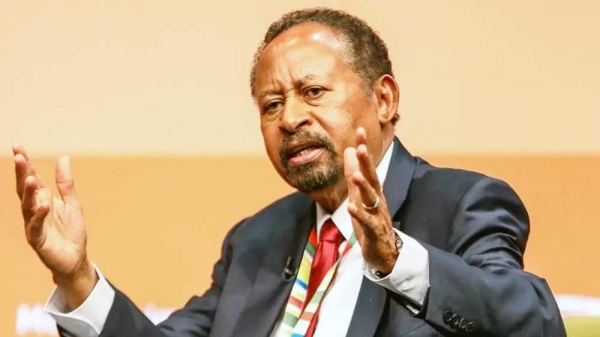
Key opposition figure urges reconciliation as death toll from clashes at mass demonstrations climbs to 11
KHARTOUM: Sudan must at all costs avoid tensions between a powerful paramilitary unit that controls Khartoum and the regular army or risk more instability following a military coup in April, leading opposition figure Sadiq Al-Mahdi said.
An influential former prime minister, Al-Mahdi called on high-profile military leader Gen. Mohamed Hamdan Dagalo, commonly known as Hemedti, to fully integrate the Rapid Support Forces (RSF) which he commands with the regular army to promote unity within the armed forces.
“The fact that there are tensions between our armed groups must be resolved peacefully,” Al-Mahdi, Sudan’s last democratically elected premier, said in an interview.
“Either people fight it out, which would be very bad for Sudan, or they accept a reconciliation process,” said Al-Mahdi, who heads the largest opposition party.
“All our political forces are going to have their minds concentrated on the need to avoid this civil war and all types of conflicts that are potentially there.”
Sudanese activists said at least 11 people were killed in clashes with security forces during mass demonstrations demanding a transition to civilian rule.
Tens of thousands of Sudanese flooded the streets of Khartoum, and other areas on Sunday in the biggest protests since security forces cleared a sit-in last month.
They called for the military to hand over power to civilians following the coup that ousted Bashir in April.
Nazim Sirraj, a prominent activist, said three bodies were found next to a school in Omdurman, the twin city of Khartoum.
The three were shot dead in an area where security forces had barred protesters from marching toward a hospital and had fired tear gas to disperse them, he said.
One wounded person died on the way to the hospital in Khartoum, he added.
Sirraj said the total death toll was 11, including one killed in the city of Atbara, a railway hub north of Khartoum and the birthplace of the December uprising that eventually led to Bashir’s ouster.
Speaking at his sprawling villa surrounded by gardens in the capital, Al-Mahdi also said the opposition had floated the idea of merging the forces to the Transitional Military Council (TMC), which has been in charge since President Omar Bashir was overthrown following protests triggered by an economic crisis.
There are no signs that a conflict is looming between the RSF and the military. And there are no apparent divisions between Hemedti, deputy head of the TMC, and its leader Lt. Gen. Abdel Fattah Al-Burhan.
But Al-Mahdi, himself toppled by Bashir in 1989, said Sudan cannot afford to take any chances during a turbulent period.
“All our minds will be concentrated on avoiding this catastrophic development which is very much on the horizon.”
The military has more firepower but taking on the RSF in the capital would inflict mass civilian casualties, say politicians, analysts and opposition figures.
Al-Mahdi’s moderate Islamic Umma party is among opposition groups who have been pressing for a transition to civilian rule in talks with the TMC that ground to a halt last month.
Hemedti has indicated he has political ambitions, delivering frequent public speeches, and promising a brighter future for Sudanese, from the same palace occupied by Bashir.
“If he looks ahead to a leadership role it will be acceptable if he becomes a civilian citizen, and if he then either forms his own party or joins whatever party he thinks is closer to his ideas,” said Al-Mahdi.
Bashir used Hemedti and his men, now deployed across Khartoum armed with rocket-propelled grenades and machine guns mounted on vehicles, to counter perceived threats from rivals under a strategy that helped him stay in power for 30 years.
“We believe he (Hemedti) must accept now that this (integration of the RSF and army) should be developed.
His force will be part and parcel of a national defense force,” said Mahdi. This should be done “in a way that will be voluntary with the armed forces.”
Al-Mahdi said chances of reconciliation could be improved by an independent investigation of violence three weeks ago in which witnesses said the RSF led a raid on a protest camp. Opposition medics reported more than 100 people killed. The government put the death toll at 61, including three security personnel.











